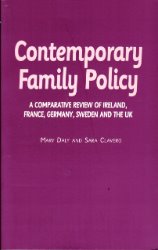
Contemporary Family Policy - A Comparative Review of Ireland, France, Germany, Sweden and the UK
Policy makers in Europe are having to radically rethink how the family is support by public policy. In a climate where economic, social and demographic developments affect the family almost at every turn, policy makers have to work continuously to both update and transform policy. The subject matter of this report is the recent reform of family policy in Ireland and Europe. Funded by the Families Research Programme, its purpose is both to identify the most significant changes which have been made in Europe in the last ten years and to compare developments in Ireland with those in a selected number of countries. Family policy for the purposes of the study is defined in a broad way. The report covers the following policy domains:
- Cash payments for families with children.
- The support of lone parent families.
- Family-related taxation.
- Reconciling working and family life.
- Childcare.
- Care of the elderly.
- Family support services.
- Children’s rights.
As well as tracing and comparing the changes in policy, the report also examines some of the impacts associated with family policy. Matters such as the effects of policy on family poverty, the redistribution of income, fertility rates and the employment participation of mothers are each considered. The implication of reform and the outstanding issues facing policy makers are also discussed. This report contains seven chapters as well as a brief introduction. The first chapter describes the historical development of family policy in Ireland, for the purpose especially of identifying the tradition and architecture of Irish social policy as it related to the family. The development of family policy in Europe is the subject matter of the second chapter, the goal being to identify similarities and differences in Ireland’s approach to the family historically, in comparison with developments elsewhere. Having identified the general state of family-related policy in Ireland elsewhere up until the late 1980s-early 1990s, the next two chapters go on to cover reform and change in the 1990s.
Chapter 3 focuses on Irish reforms whereas Chapter 4 details the most significant developments in France, Germany and Sweden and the UK. Chapter 5 turns to impacts associated with family policy considering some evidence on horizontal redistribution, poverty alleviation, fertility rates and employment levels among women. The next chapter draws out some policy issues facing Ireland, focusing on topics which have been the subject of debate and review as well as those which this research identifies as key issues facing Irish social policy. A brief overview chapter draws the report to a close.